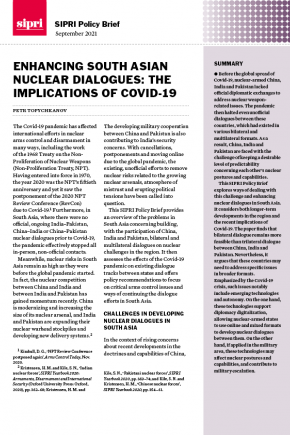Enhancing South Asian Nuclear Dialogues: The Implications of Covid-19
Before the global spread of Covid-19, nuclear-armed China, India and Pakistan lacked official diplomatic exchanges to address nuclear weapon-related issues. The pandemic then halted even unofficial dialogues between these countries, which had existed in various bilateral and multilateral formats. As a result, China, India and Pakistan are faced with the challenge of keeping a desirable level of predictability concerning each other’s nuclear postures and capabilities.
This SIPRI Policy Brief explores ways of dealing with this challenge and enhancing nuclear dialogues in South Asia. It considers both longer-term developments in the region and the recent implications of Covid-19. The paper finds that bilateral dialogue remains more feasible than trilateral dialogue between China, India and Pakistan. Nevertheless, it argues that these countries may need to address specific issues in broader formats. Emphasized by the Covid-19 crisis, such issues notably include emerging technologies and autonomy. On the one hand, these technologies support diplomacy digitalization, allowing nuclear-armed states to use online and mixed formats to develop nuclear dialogues between them. On the other hand, if applied in the military area, these technologies may affect nuclear postures and capabilities, and contribute to military escalation.
Challenges in developing nuclear dialogues in South Asia
The implications of Covid-19 for nuclear CBMs and dialogues in South Asia
Conclusions

